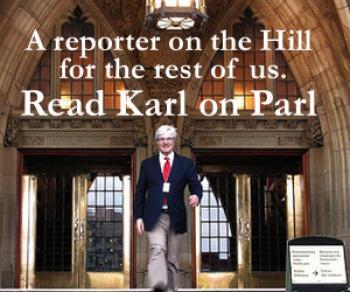The federal budget arrives on Thursday and the usual managing expectations exercise is in full swing.
The Finance Minister’s entourage has fed the Government’s story to select media.
It will be, the “inside sources” say, a no-surprise, stand-pat budget that will close some “corporate” loopholes, continue to cut spending and make some yet-to-be-defined moves to hold the provinces more accountable for their use of federal monies earmarked for employment training.
Not a word about continued stealth attacks on the environment, civil society groups and trade unions.
That’s not part of the official story.
Will unions get the full brunt of Conservative animus?
There is great concern in the union movement that some of the attacks on unions’ capacity to raise money and spend it by their own lights — attacks that we have already seen in Conservative private members’ bills — will find full-on government support in this budget.
That will be one stealth attack worth looking carefully for.
In the meantime, progressive voices — from the Centre for Policy Alternatives (CCPA), to the Public Service Alliance of Canada (PSAC) to the NDP — are trying to manage budgetary expectations in their own way.
The CCPA presented its Alternate Budget last week, while, earlier this week, the NDP launched a pre-budget “campaign” calling for major public transit and other infrastructure investment (dovetailing with Toronto MP Olivia Chow’s work on the public transit issue) and restoration of Old Age Security benefits at 65.
On Tuesday, PSAC issued a fairly detailed paper: ‘What we need from the 2013 Federal Budget.’
It documents the impact of cuts so far, not only on the union’s members’ jobs, but on services.
The paper mentions cuts to front line service providers at Human Resources Development Canada. Those include the people who deal directly with Employment Insurance and public pensions.
It points out the near total lack of public support for the brutal closure of the very cost-effective (in fact, cheap) Experimental Lakes program and the shuttering of 19 Immigration offices and nine Veterans’ Affairs offices throughout Canada.
And, at a time when the urgent needs of First Nations Canadians should be high on the Government’s agenda, PSAC notes this:
“Massive cuts to the First Nations and Inuit Health Branch — the hardest hit branch in Health Canada — have jeopardized Aboriginal peoples’ health. Funding for health programming offered by all national Aboriginal organizations has been reduced by 40 per cent. This has impacted programs such as the Aboriginal Diabetes Initiative, the Maternal and Child Health program and the Youth Suicide Prevention Strategy.”
The union calls on the government to end spending cuts, quoting a Parliamentary Budget Office (PBO) document that estimates the cuts will reduce Canada’s GDP by a half to one per cent, per year, over the next three years.
The Federal Court to hear the PBO
As for the PBO, the current Officer, Kevin Page, whose term is up in a matter of days, gets his Federal Court hearing on Thursday, budget day.
Is that a coincidence, or what?
Page is seeking the Court’s assistance, after he failed to get the Government to share with him details of its spending cuts and their impact on services and personnel.
Page points out that his Office’s mandate is to examine fiscal policy in relation to the Canadian economy and report to all members of Parliament accordingly.
The current spending cuts are a key element of this government’s fiscal policy.
But Ministers from the Treasury Board’s Tony Clement to Finance Minister Jim Flaherty have argued that Page’s legal role only entitles him to look at what a government plans to spend, not what it does not plan to spend.
To some, that sounds like the argument a sneaky corporate controller who tried to withhold information from auditors might make: “We only have to show you our profits, not our losses.”
More omnibus tactics?
Previous budgets have been omnibus affairs, of course, including measures that should be introduced by multiple ministers and not just the Finance Minister, and examined by many different Parliamentary committees.
In the two previous budgets, the Finance Minister has thrown in measures that should rightfully belong to the Environment, Human Resources, Natural Resources, Fisheries, Aboriginal Affairs, Health and Agriculture Ministers, to give only a partial list.
Operating this way, the government has managed to avoid detailed examination and discussion of its agenda.
In some cases, the budget itself has not mentioned the non-Finance Department legislation it contains. We have had to wait for the subsequent Implementation Bills for that, and carefully read the fine print.
One area this budget will likely touch on is immigration, even though Immigration Minister Jason Kenney has something of star status in Harper’s cabinet, and has not been shy to openly push his own often divisive and controversial initiatives.
The coming budget will, nonetheless, include something on immigration levels and programs to match skills needs with immigrants. Those are low-cost measures, so easy for the Government to do, and this Government has made immigration a key element of labour market — and, therefore, economic — policy.



